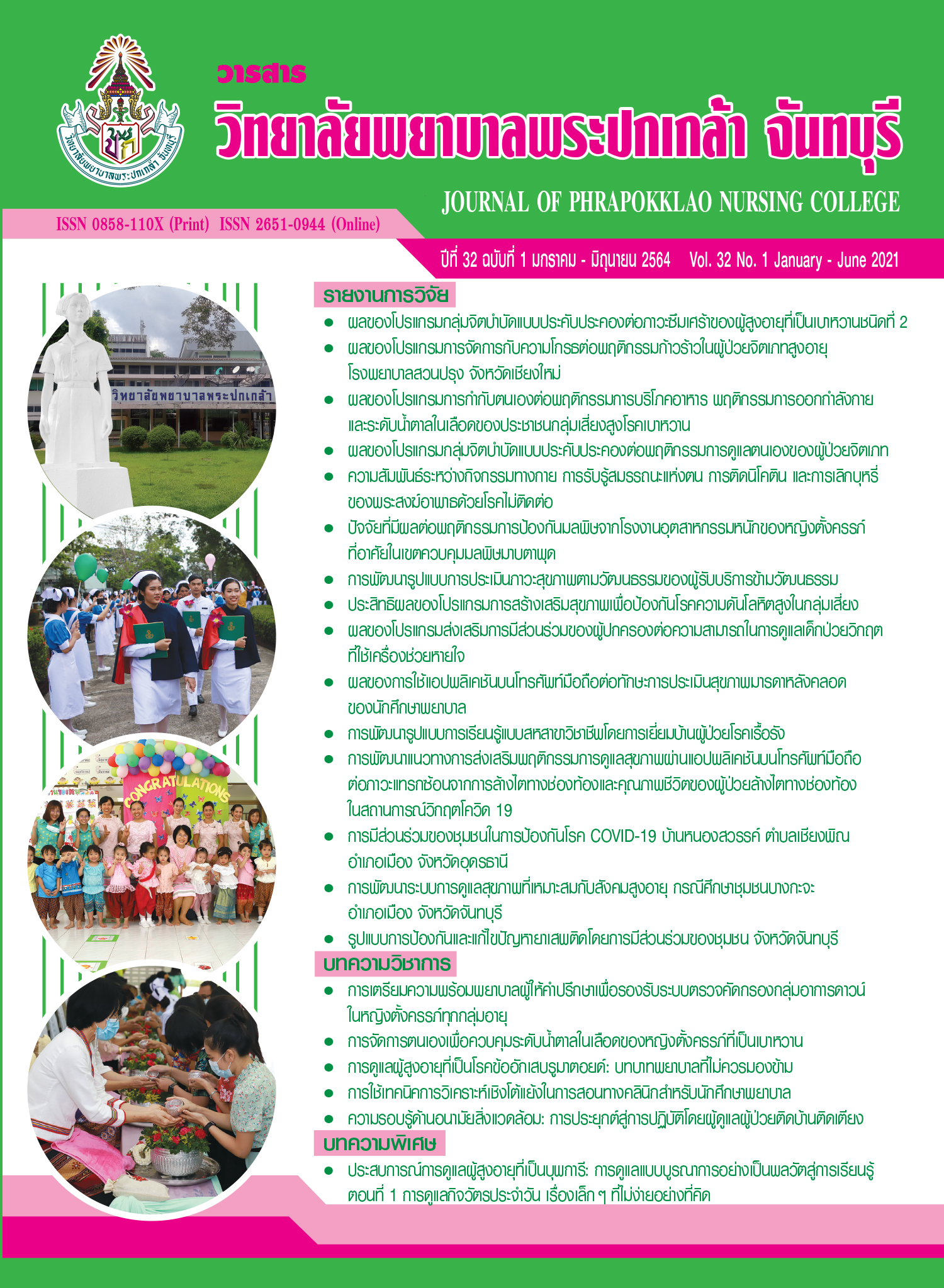The Development of Guideline to Promote Healthcare Behavior through Mobile Health (mHealth) Application on Peritoneal Dialysis Complication and Quality of Life in Patients Undergoing Peritoneal Dialysis during COVID-19 Situation
Keywords:
Healthcare behavior, Mobile application, Peritoneal dialysis, COVID-19Abstract
This research and development aimed to develop and examine the effectiveness of guideline to promote healthcare behavior through mobile health (mHealth) application on peritoneal dialysis complication and quality of life in patients undergoing peritoneal dialysis during COVID-19 situation. The three phases study including phase 1: situation analysis, the samples consisted of the doctors, nurses, and patients/ caregivers (n = 10); phase 2: guideline development and feasibility study, the samples consisted of the nurses (n = 10) and patients/ caregivers (n = 15); and phase 3: examine the effectiveness of the guideline, the samples consisted of patients/ caregivers who were divided into the experimental group (n = 45) and the control group (n = 45). The research instruments included the guideline to promote healthcare behavior through mobile health (mHealth) application for complication prevention and quality of life promotion in patients undergoing peritoneal dialysis during COVID-19 situation, the semi-structured interview, the feasibility of guideline implementation questionnaire with reliability as .93, the demographic questionnaire, the Kidney Disease Quality of Life-Short Form version 1.3 (KDQOL-SFTM 1.3), and the symptom and complication datasheet. The implementation and data collection were conducted from September, 2020 to January, 2021. Data were analyzed using content analysis, frequency, percentage, mean, standard deviation, Chi-square test, Fisher’s exact test, paired t-test, and independent t-test.
The research results revealed that 1) the guideline to promote healthcare behavior through mobile health (mHealth) application was the method to deliver the important knowledge information for the patient undergoing peritoneal dialysis to perform self-care behaviors via line application including health assessment, abnormal symptoms, common health problems, nutrition, regular use medicine, and health performance, 2) both nurses and patients/ caregivers indicated that the level of feasibility was high, 3) the experimental group had the incidence of peritoneal dialysis complications lower than those of the control group, and 4) after the experiment, the experimental group had statistically significant higher mean score of quality of life than those of before the experiment and those of the control group.
This research suggests that health care providers should apply this guideline to promote healthcare behavior through mobile health (mHealth) application to promote self-care behavior among patients undergoing peritoneal dialysis or promote caregiver capacity to provide care.
References
ขนิษฐา หอมจีน, และพรรณทิพา ศักดิ์ทอง. (2553). การแปลและทดสอบกระบวนการคิดของแบบสอบถามคุณภาพชีวิตในโรคไตฉบับย่อภาษาไทย เวอร์ชัน 1.3. วารสารเภสัชกรรมไทย, 2(1), 3–14.
ปกรณ์ ตุงคะเสรีรักษ์. (2559). การติดเชื้อของการล้างไตทางช่องท้องของโรงพยาบาลสุรินทร์ อะไรคือความแตกต่าง. ศรีนครินทร์เวชสาร, 31(4), 167–172.
สุธิดา นครเรียบ, ดวงรัตน์ วัฒนกิจไกรเลิศ, วิชชุดา เจริญกิจการ, สงคราม โชติกอนุชิต, และวชิรศักดิ์ วานิชชา. (2017). ประสิทธิผลของโมบายแอพพลิเคชั่นต่อความร่วมมือในการรับประทานยาในผู้ป่วยโรคหลอดเลือดสมอง. Journal of Nursing Science, 35(3), 58–69.
สุภัทรา สีเสน่ห์, ดวงรัตน์ วัฒนกิจไกรเลิศ, วิชชุดา เจริญกิจการ, ฉัตรกนก ทุมวิภาต, และวชิรศักดิ์ วานิชชา. (2561). ผลของโมบายแอพพลิเคชั่นต่อความร่วมมือในการรับประทานยาในผู้ป่วยภาวะหัวใจขาดเลือดเฉียบพลันภายหลังได้รับการจำหน่ายออกจากโรงพยาบาล. วารสารพยาบาลกระทรวงสาธารณสุข, 28(1), 61–74.
Chow, S. K. Y., & Wong, F. K. Y. (2010). Health-related quality of life in patients undergoing peritoneal dialysis: Effects of a nurse-led case management programme. Journal of Advanced Nursing, 66(8), 1780–1792. doi:10.1111/j.1365-2648.2010.05324.x
Giansanti, D. (2020). WhatsApp in mHealth: An overview on the potentialities and the opportunities in medical imaging. mHealth, 6, 19. doi:10.21037/mhealth.2019.11.01
Jha, V., & Modi, G. K. (2018). Getting to know the enemy better–the global burden of chronic kidney disease. Kidney International, 94(3), 462–464. doi:10.1016/j.kint.2018.05.009
Kim, Y.-L., & Biesen, W. V. (2017). Fluid overload in peritoneal dialysis patients. Seminars in Nephrology, 37(1), 43–53. doi:10.1016/j.semnephrol.2016.10.006
Lozano-Lozano, M., Cantarero-Villanueva, I., Martin-Martin, L., Galiano-Castillo, N., Sanchez, M.-J., Fernández-Lao, C., … Arroyo-Morales, M. (2019). A mobile system to improve quality of life via energy balance in breast cancer survivors (BENECA mHealth): Prospective test-retest quasiexperimental feasibility study. JMIR mHealth and uHealth, 7(6), e14136. doi:10.2196/14136
Marcolino, M. S., Oliveira, J. A. Q., D’Agostino, M., Ribeiro, A. L., Alkmim, M. B. M., & Novillo-Ortiz, D. (2018). The impact of mHealth interventions: Systematic review of systematic reviews. JMIR mHealth and uHealth, 6(1), e23. doi:10.2196/mhealth.8873
Sitjar-Suñer, M., Suñer-Soler, R., Masià-Plana, A., Chirveches-Pérez, E., Bertran-Noguer, C., & Fuentes-Pumarola, C. (2020). Quality of life and social support of people on peritoneal dialysis: Mixed methods research. International Journal of Environmental Research and Public Health, 17(12), 4240. doi:10.3390/ijerph17124240
Wallace, E. L., Rosner, M. H., Alscher, M. D., Schmitt, C. P., Jain, A, Tentori, F., … Sloand, J. A. (2017). Remote patient management for home dialysis patients. Kidney International Reports, 2(6), 1009–1017. doi:10.1016/j.ekir.2017.07.010
World Health Organization. (2011). mHealth: New horizons for health through mobile technologies: Second global survey on eHealth. Retrieved from https://apps.who.int/iris/handle/10665/44607
World Health Organization. (2018). mHealth: Use of appropriate digital technologies for public health. Retrieved from https://apps.who.int/gb/ebwha/pdf_files/WHA71/A71_20-en.pdf
Downloads
Published
How to Cite
Issue
Section
License
เนื้อความ ข้อมูล และรายการอ้างอิงที่ผู้เขียนใช้ในการเขียนบทความเพื่อลงตีพิมพ์ในวารสารวิทยาลัยพยาบาลพระปกเกล้า จันทบุรี ถือเป็นความคิดเห็นและความรับผิดชอบของผู้เขียน คณะผู้จัดทำวารสารไม่จำเป็นต้องเห็นพ้องด้วยหรือร่วมรับผิดชอบ
บทความที่ได้รับการลงตีพิมพ์ในวารสารวิทยาลัยพยาบาลพระปกเกล้า จันทบุรี ถือเป็นลิขสิทธิ์ของวารสารวิทยาลัยพยาบาลพระปกเกล้า จันทบุรี หากหน่วยงานหรือบุคคลใดต้องการนำส่วนหนึ่งหรือทั้งหมดของบทความไปเผยแพร่ต่อเพื่อวัตถุประสงค์ใด ๆ จะต้องได้รับอนุญาตจากบรรณาธิการวารสารก่อน



